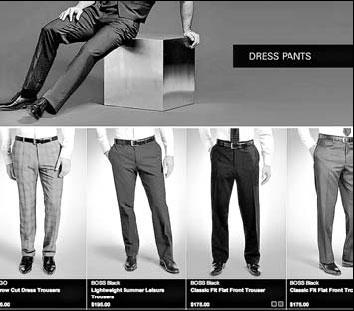
Risking the wrath of department stores, high-end clothing brands like Hugo Boss are selling wares on the nternet. Suzanne Dechillo / New York Times

Among the offferings online at Hugoboss.com.
In the genteel world of luxury, companies long believed that the Web was no place for merchandising. And there was a gentleman's agreement with department stores not to siphon sales by reaching out directly to wealthy customers.
Then came the recession, and out went the niceties. Department stores slashed prices on $1,200 handbags, while luxury lines fretted about losing their exclusivity. Now, come September, marcjacobs.com is going retail, 10 years after most brands opened Web showrooms.
"I was so annoyed last year that I wished no one had our merchandise," said Robert Duffy, the president and vice chairman of Marc Jacobs. "All the department stores were panicked, and they were marking things down."
Other luxury brands - Jimmy Choo, Hugo Boss, Lancme, St. John, Kiehl's, Lilly Pulitzer, Donna Karan and La Perla - have started or soon will start selling their products through their Web sites. If it infuriates department stores or brings in customers who might have earned a glare from haughty clerks, who cares, as long as people are buying at full price?
"The recession forced these manufacturers to realize they needed to look for revenue wherever they could," said Jeffrey Max, chief executive of Venda, which handles technology for e-commerce sites.
Adding to the Web's appeal, profits are much higher on clothes sold directly to consumers, since no middleman takes a cut. And the brands can control pricing and styling.
When companies started to sell items online in the 1990s, most luxury brands paid little attention. By the mid-2000s, a few high-end companies were selling their products directly, but most didn't bother.
"Luxury brands were a little hesitant or reticent, because they were struggling with how to convey and create an experience that was rich," said Mark Brashear, chairman and chief executive for the Americas at Hugo Boss, which introduced its e-commerce site in April.
But by the time the luxury market slid last year, attitudes were changing.
"An elegant, sophisticated online store with a high level of data security can be had for a few hundred thousand dollars now - that's probably less than the legal fees to review a lease for a store on Fifth Avenue," Mr. Max said.
And in 2009, as the worldwide luxurygoods industry fell 8 percent, to under $230 billion, luxury sales online were forecast to grow 20 percent, according to Bain & Company, a global management consulting firm. Suddenly, the brands that had sniffed at e-commerce looked rather foolish.
For the final holdouts, battles with department stores pushed them over the edge. Department stores ordered too much inventory for 2009 and were left with piles of unsold clothes when consumer spending declined. The stores slashed prices - meaning less revenue for the clothing makers, along with a potential image problem when a $500 shirt sold for $200.
And at the end of July there was more bad news from luxury retailers, as new data for June showed that luxury department stores fared worse than department stores in general compared with a year earlier.
Unlike the snooty boutiques, the Web sites will welcome anyone. "I don't think they're trying to exclude anybody," said Jem Ripley, vice president at the marketing firm SapientNitro, which is designing sites for Hugo Boss and Kiehl's.
The department stores are responding by reinforcing their loyalty programs, offering discounts and doing aggressive e-mail marketing to customers.
But the brands are fighting back by, for example, selling special products only online. "I want to give people a reason to go there - if I have the same stuff on our Web site that's at Neiman's and Saks," the site would have little appeal, Mr. Duffy of Marc Jacobs said.
Asked if he was worried that retailers might be upset, Mr. Duffy said he was unconcerned.
"I'm the one that should get huffy that they have it on their Web site," he said.
Related News
Photos
More>>trade
market
finance
- Istanbul launches fashion week
- Designs of Elegance and Taste by Designer Luis Machicao to be Shown at Couture
- Zizi Cardow Returns to Couture Fashion Week New York with Latest Vibrant
- Sarenza proposes new eco shoe brand to UK market: Faguo
- Miss Universe Australian heats up runway at Sydney Fashion Show





